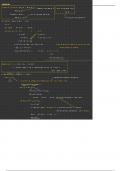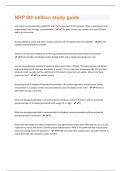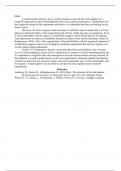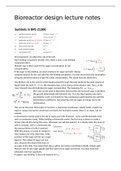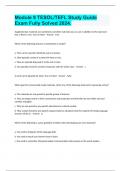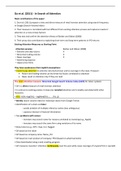(2 4).
Exact DES
of the
An DE form Al
y) di B(x y) dy
:
exact is + ,
= 0
"derivative of
,
B with respect "Theorem for function f(x y) ,
to any
:
a ,
where Bx ?
:
Ay =
fcy
=
fue
The solution is f(x y) f exists Ay Bc.
C such
only when
: =
,
an =
where :
fi : A
fy = B . we know this from math 145.
,
eng
y) dx (2xy 1)dy
:
(x x 1
eg y())
= :
+ + + - = 0
,
Bx ?
Ay
· =
Ay z(x + y) Bx
2y Ay B
= = =
+ 2) :
.
find f(x y) such that fx =
A 3 fy B
·
=
,
y)2
Wie
fx (x x
fy 2xy 1
=
+ = + -
derive
xz
= +
2Szy +
y2 :
f =
xyz +
xy -
y
+ h(x)
:
f =
(3 + x
y
+
xyz +
g(y)
so jx3 +
x(y +
xyz +
g(y) =
xyz +
xy
-
y
+
h(x) ·
don't do both like this ,
rather do one
,
then sub into the other
.
:
g(y)
= -
y}n(x) =
jx3 see next example for clarification
.
·
f(x y),
=
jx3 +
xy +
xyz
-
y
=
C but y(1) =
155 + 1 + 1 -
1 =
. c =
4
&( x
xy 5
: +
y +
y
- =
Ad
Integrating factors if Boy is exact
:
w = + not ,
it is sometimes possible to find an
integrating factor such that
go is exact ,
ie :
gAd +
gBdy is exact.
A
eg
:
solve y(x y + +
1)dx + x + 2y) dy =
0
,
f(x) =
,
y
exact ? Ay =
Bx ? both
might work , one
might work
,
none
might work.
&
2y + x + 1 I :
no
, not exact.
Try multiplying by an
integrating factor I or
Ily) to make it exact :
[(x) y (x 1)0x
[(( zy) dy-
+ 0
. .
+
y + +
new A
exact ? to make Ay Bx
try
·
= :
[x . (x +
2y + 1) = [() . (1) + I'x) . (x +
zy)
I'(sc) (x) zy) I(x) (sz zy)
=
.
+ . +
I' (s2) =
1(S2)
:
I(x) = e :
new DE : ey . (x +
y + 1)dx + e? (x +
zy)dy
=
0 which is exact !
find f(x y) such that ex? (x
fy B
zy)
·
:
,
= = +
ex e
fy x
=
zy
.
+ .
=A
:
y
=
x .
y e" . +
ye +
g(x) =
0 ,
now derive w r t
. .
x :
fx =
y(x .
ex + e) +
y!
ex +
g(x) =
e y(x +
y
+
1)
:
yoe" ye" + +
ye +
g(x) =
yxe" yze ye+ +
=
g'(x) = 0
,
take
g(x) = 0
f(x y) ,
=
c xye" +
yze" = c ,
set
y(0)
=
1 : c =
1
:
yxe" +
ye =
1
,eg
:
find an
integrating factor I which will make
cydi + (2x2 +
3y2-20) dy ,
exact
A B
Not exact because Ay + Bs.
make by dy (2x
Try by multiplying I() [ (C) 3y2 20) dy
[K
to it exact :
+ + =
0
sy
-
·
.
B
Can we make it exact ? Ay =
Bx,
Ay =
I(x) .
x =
Bx =
['() . (2x2 +
3yz -
20) + [(x) . (4x)
:
I' (sc) (2x2 20) [(x) ( 3x)
3yz
+ = -
-
.
.
I'() = ( which does not make sense (can't hav so
Try to make it exact
by multiplying by I(y)
:
F(y) xy dy
·
+
I (y) (2x.
+
3y2 20) dy - =
0
A
B
Can we make it exact ? Ay =
Bx,
Ay I'(y) xy I(y) Bx [(y) (4()
= =
. + . x =
.
:
I'(y) I(y) 3x
=
.
xy .
I'(y) =
I(y) .
33
:
I'(y) =
[(y) .
3
85 . =
3
CE Ol =
/gdy :
Inl =
3Iny
:
I =
y3
.
(2 5)
.
solutions by substitutions
Homogeneous DES : a function f(x y) , is
homogenous of degree n if flac ay) ,
=
a f(x y) . ,
eg
:
f(x y) ,
=
y +
By is not
homogenous.
In practice ,
this means that for each term in f ,
the sum of the
degrees of c by must be the same . f(x y) ,
=
xy 3x*y + is
homogenous of degree 5.
solving a
homogenous DE :
to solve A(x ,
y)@x + B(x ,
y) dy
=
0
, eg
:
solve (x +
y2)dx +
(2
-
xy)dy =
0
,
↑
where A 3 B are both
homogenous of the same
degree, A ↳ is
homogenous of degree .
2
make the substitution (orx vy), try y(x u) dy udx xdu
Us
: =
y
= =
,
=
ux =
+
you'll end up with a solvable separable DE.
y
=
u(() .
x
:
(x + u2j2)dx + (x2 ux2)(udx
-
+ xdu)
:
(x2 + u2x + x (u -
42x2)dx + (x3 - ux3)du =
0
eg
: solve :
( +
zy2) =
xy , y( -
1) =
1 ·
(2(1 + u)dx + x3(1 -
u)du =
0
homogenous of degree two Sox =
-
:
le + y(x u) ,
=
ux
dy =
xdu + u0x :
(x dx =
-J , Indu : le + w = 1+ u
,
u = w -
,
dw = du
2x[u2)dx /1 -1 d /-
-
·
(x2 + =
xu(xdu +
udx) = d
(s(2 + 2x[uz)dx =
(3udu + xuzdx =
z(n(w) -w =
z(m(u 1) + -
(u 1) -
(1 +
uz)dx =
cudu : Ink) = -
(2(n)1 + -
(3 1))
,
-
+ c
Ji 0x =
J , fuz On let 1uz = w on =
zu ou I mkc) = -
(2(n(((x -
)(x + y))) -
- +
1) + C
Ink) =
[ /1 + u21 + c =
/wo (n(x2) = -
(2ink - 1 + 2 in(s + y) -
3 + 1) + C
In (2) . 2 =
(n(1 + uz) + D (n(x) =
2 (n() -
zink + y) +
, + D
In/sc-
&
In (x2) = (n(1 + uz) + D ==
xz =
eP(1 + uz) -
In(2) + (n((x + y(4 =
G + D
, x2 =
A(1 +
4) In (y) = +
A(x2 y (xty aeP
+
x =
DER
(4 =
A(x2 yz) + :
y( 1)
- =
1 (x +y k .
e3 (k <
0)
:
1 =
A(z) = A =
2 Case 1 : 0 :
(3) = x OR Case z : <0 :
(x) = -
(4 =
((x2 yz) +
-
+y ke (k < 0) -
+y =
ke(k(0)
.
. e (AEIR)
&
solving a Bernoulli DE :
of the form & +
Pay =
flyd, eg
:
solve -y
=
e'y ,
y '" e
2
make substitution : n =
,
then it becomes a linear DE
,
Bernouli DE With P =
-1
, f(x)
=
,
n
=
2 so let u =
y =
y" ie :
y
=
u
use an
integrating factor . = u -
- 2
- eu
+ -
2
+ yz + : -
u =
eg
:
-
+ =
y
y + +
y = +
y
. + u = e Clinear DE) ...
I = e(POx = e(0x = ex
( e2dx
le-y
y -
fy = -
+ 2 y) : e u = -
egit
du In
-
4-2 .
84 -
tu" = -
t 24
-
2
Ot
·
=
E + eu = -
je( + C(((()
*
y
Y
++ u = -
linear DE .
:
It =
Ae : u = -
je + ce
.
eSt
"
Ot +)
-((
I(t) = =
+ :
y
=
zex +
c
- tu =
/ +" Of =
(n(t) + > put u =
y
+ :
y t =
(n(t) + 2
If :
ODE has the form =
f(Ax +
By +
1) ,
A ,
B
,
C constants
, eg
:
solve =
( -2x +
y) 2 -
then make substitution u =
Ax +
By + 2 to reduce to sperable DE
. let u(x) = 2x +
y
= -
2 +
8 + 2
:
u2 =
+
: G =
u2 -
a dx =
du
yu 3)(u
-
+ 3)
by parts
:
(n-su + 3)
= Eg +
u33
1 = A(u + 3) + B(u -
3) ,
A + B =
033A -
3B =
1
:
A =
5 3B = -
5
:
Jus du =
)de
: (In /u -3) -
(n(u + 3)) =
x + c (CEIR)
)
-
: In /u -31 +
(n(u + 3) = 6x + 6
-
In/3 =
6x + 62
3
*
=
k e (k = e (0) solve for :
u -3 = ke
*
(n 3)
.
, y +
u -
3 =
u .
ke6x + 3ke6
*
n(1 -
kebx) =
3(1 + ke )
u =
3 =
y
-
2
:
y
=
3 + 26
Exact DES
of the
An DE form Al
y) di B(x y) dy
:
exact is + ,
= 0
"derivative of
,
B with respect "Theorem for function f(x y) ,
to any
:
a ,
where Bx ?
:
Ay =
fcy
=
fue
The solution is f(x y) f exists Ay Bc.
C such
only when
: =
,
an =
where :
fi : A
fy = B . we know this from math 145.
,
eng
y) dx (2xy 1)dy
:
(x x 1
eg y())
= :
+ + + - = 0
,
Bx ?
Ay
· =
Ay z(x + y) Bx
2y Ay B
= = =
+ 2) :
.
find f(x y) such that fx =
A 3 fy B
·
=
,
y)2
Wie
fx (x x
fy 2xy 1
=
+ = + -
derive
xz
= +
2Szy +
y2 :
f =
xyz +
xy -
y
+ h(x)
:
f =
(3 + x
y
+
xyz +
g(y)
so jx3 +
x(y +
xyz +
g(y) =
xyz +
xy
-
y
+
h(x) ·
don't do both like this ,
rather do one
,
then sub into the other
.
:
g(y)
= -
y}n(x) =
jx3 see next example for clarification
.
·
f(x y),
=
jx3 +
xy +
xyz
-
y
=
C but y(1) =
155 + 1 + 1 -
1 =
. c =
4
&( x
xy 5
: +
y +
y
- =
Ad
Integrating factors if Boy is exact
:
w = + not ,
it is sometimes possible to find an
integrating factor such that
go is exact ,
ie :
gAd +
gBdy is exact.
A
eg
:
solve y(x y + +
1)dx + x + 2y) dy =
0
,
f(x) =
,
y
exact ? Ay =
Bx ? both
might work , one
might work
,
none
might work.
&
2y + x + 1 I :
no
, not exact.
Try multiplying by an
integrating factor I or
Ily) to make it exact :
[(x) y (x 1)0x
[(( zy) dy-
+ 0
. .
+
y + +
new A
exact ? to make Ay Bx
try
·
= :
[x . (x +
2y + 1) = [() . (1) + I'x) . (x +
zy)
I'(sc) (x) zy) I(x) (sz zy)
=
.
+ . +
I' (s2) =
1(S2)
:
I(x) = e :
new DE : ey . (x +
y + 1)dx + e? (x +
zy)dy
=
0 which is exact !
find f(x y) such that ex? (x
fy B
zy)
·
:
,
= = +
ex e
fy x
=
zy
.
+ .
=A
:
y
=
x .
y e" . +
ye +
g(x) =
0 ,
now derive w r t
. .
x :
fx =
y(x .
ex + e) +
y!
ex +
g(x) =
e y(x +
y
+
1)
:
yoe" ye" + +
ye +
g(x) =
yxe" yze ye+ +
=
g'(x) = 0
,
take
g(x) = 0
f(x y) ,
=
c xye" +
yze" = c ,
set
y(0)
=
1 : c =
1
:
yxe" +
ye =
1
,eg
:
find an
integrating factor I which will make
cydi + (2x2 +
3y2-20) dy ,
exact
A B
Not exact because Ay + Bs.
make by dy (2x
Try by multiplying I() [ (C) 3y2 20) dy
[K
to it exact :
+ + =
0
sy
-
·
.
B
Can we make it exact ? Ay =
Bx,
Ay =
I(x) .
x =
Bx =
['() . (2x2 +
3yz -
20) + [(x) . (4x)
:
I' (sc) (2x2 20) [(x) ( 3x)
3yz
+ = -
-
.
.
I'() = ( which does not make sense (can't hav so
Try to make it exact
by multiplying by I(y)
:
F(y) xy dy
·
+
I (y) (2x.
+
3y2 20) dy - =
0
A
B
Can we make it exact ? Ay =
Bx,
Ay I'(y) xy I(y) Bx [(y) (4()
= =
. + . x =
.
:
I'(y) I(y) 3x
=
.
xy .
I'(y) =
I(y) .
33
:
I'(y) =
[(y) .
3
85 . =
3
CE Ol =
/gdy :
Inl =
3Iny
:
I =
y3
.
(2 5)
.
solutions by substitutions
Homogeneous DES : a function f(x y) , is
homogenous of degree n if flac ay) ,
=
a f(x y) . ,
eg
:
f(x y) ,
=
y +
By is not
homogenous.
In practice ,
this means that for each term in f ,
the sum of the
degrees of c by must be the same . f(x y) ,
=
xy 3x*y + is
homogenous of degree 5.
solving a
homogenous DE :
to solve A(x ,
y)@x + B(x ,
y) dy
=
0
, eg
:
solve (x +
y2)dx +
(2
-
xy)dy =
0
,
↑
where A 3 B are both
homogenous of the same
degree, A ↳ is
homogenous of degree .
2
make the substitution (orx vy), try y(x u) dy udx xdu
Us
: =
y
= =
,
=
ux =
+
you'll end up with a solvable separable DE.
y
=
u(() .
x
:
(x + u2j2)dx + (x2 ux2)(udx
-
+ xdu)
:
(x2 + u2x + x (u -
42x2)dx + (x3 - ux3)du =
0
eg
: solve :
( +
zy2) =
xy , y( -
1) =
1 ·
(2(1 + u)dx + x3(1 -
u)du =
0
homogenous of degree two Sox =
-
:
le + y(x u) ,
=
ux
dy =
xdu + u0x :
(x dx =
-J , Indu : le + w = 1+ u
,
u = w -
,
dw = du
2x[u2)dx /1 -1 d /-
-
·
(x2 + =
xu(xdu +
udx) = d
(s(2 + 2x[uz)dx =
(3udu + xuzdx =
z(n(w) -w =
z(m(u 1) + -
(u 1) -
(1 +
uz)dx =
cudu : Ink) = -
(2(n)1 + -
(3 1))
,
-
+ c
Ji 0x =
J , fuz On let 1uz = w on =
zu ou I mkc) = -
(2(n(((x -
)(x + y))) -
- +
1) + C
Ink) =
[ /1 + u21 + c =
/wo (n(x2) = -
(2ink - 1 + 2 in(s + y) -
3 + 1) + C
In (2) . 2 =
(n(1 + uz) + D (n(x) =
2 (n() -
zink + y) +
, + D
In/sc-
&
In (x2) = (n(1 + uz) + D ==
xz =
eP(1 + uz) -
In(2) + (n((x + y(4 =
G + D
, x2 =
A(1 +
4) In (y) = +
A(x2 y (xty aeP
+
x =
DER
(4 =
A(x2 yz) + :
y( 1)
- =
1 (x +y k .
e3 (k <
0)
:
1 =
A(z) = A =
2 Case 1 : 0 :
(3) = x OR Case z : <0 :
(x) = -
(4 =
((x2 yz) +
-
+y ke (k < 0) -
+y =
ke(k(0)
.
. e (AEIR)
&
solving a Bernoulli DE :
of the form & +
Pay =
flyd, eg
:
solve -y
=
e'y ,
y '" e
2
make substitution : n =
,
then it becomes a linear DE
,
Bernouli DE With P =
-1
, f(x)
=
,
n
=
2 so let u =
y =
y" ie :
y
=
u
use an
integrating factor . = u -
- 2
- eu
+ -
2
+ yz + : -
u =
eg
:
-
+ =
y
y + +
y = +
y
. + u = e Clinear DE) ...
I = e(POx = e(0x = ex
( e2dx
le-y
y -
fy = -
+ 2 y) : e u = -
egit
du In
-
4-2 .
84 -
tu" = -
t 24
-
2
Ot
·
=
E + eu = -
je( + C(((()
*
y
Y
++ u = -
linear DE .
:
It =
Ae : u = -
je + ce
.
eSt
"
Ot +)
-((
I(t) = =
+ :
y
=
zex +
c
- tu =
/ +" Of =
(n(t) + > put u =
y
+ :
y t =
(n(t) + 2
If :
ODE has the form =
f(Ax +
By +
1) ,
A ,
B
,
C constants
, eg
:
solve =
( -2x +
y) 2 -
then make substitution u =
Ax +
By + 2 to reduce to sperable DE
. let u(x) = 2x +
y
= -
2 +
8 + 2
:
u2 =
+
: G =
u2 -
a dx =
du
yu 3)(u
-
+ 3)
by parts
:
(n-su + 3)
= Eg +
u33
1 = A(u + 3) + B(u -
3) ,
A + B =
033A -
3B =
1
:
A =
5 3B = -
5
:
Jus du =
)de
: (In /u -3) -
(n(u + 3)) =
x + c (CEIR)
)
-
: In /u -31 +
(n(u + 3) = 6x + 6
-
In/3 =
6x + 62
3
*
=
k e (k = e (0) solve for :
u -3 = ke
*
(n 3)
.
, y +
u -
3 =
u .
ke6x + 3ke6
*
n(1 -
kebx) =
3(1 + ke )
u =
3 =
y
-
2
:
y
=
3 + 26

